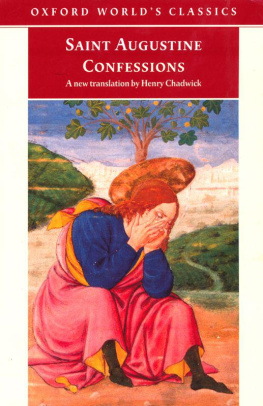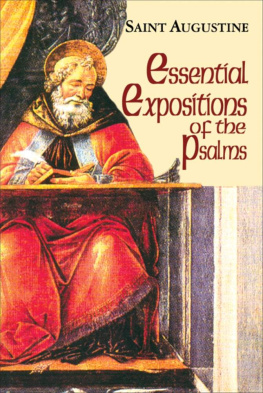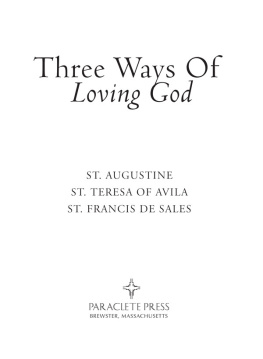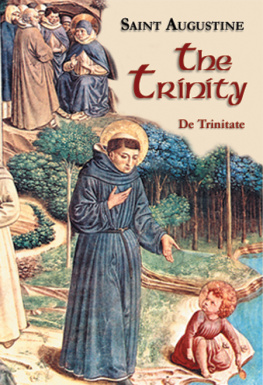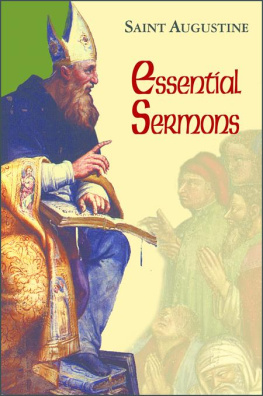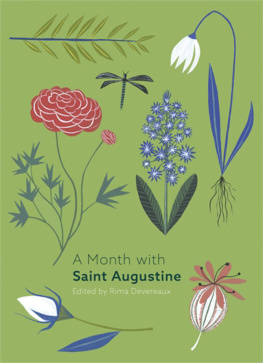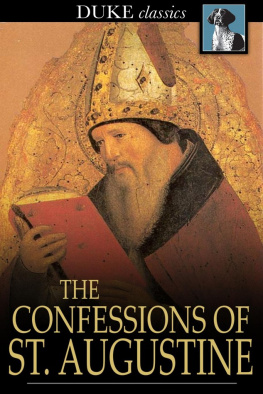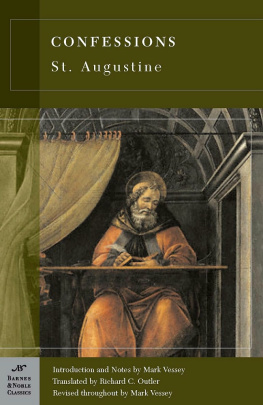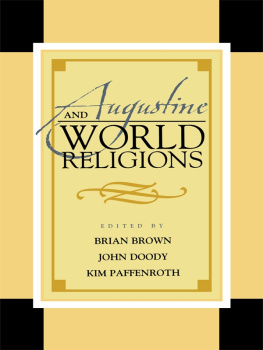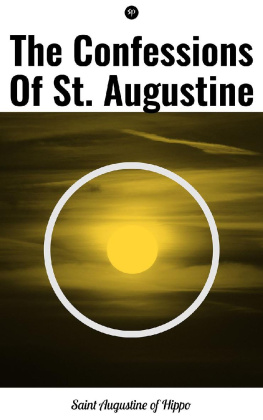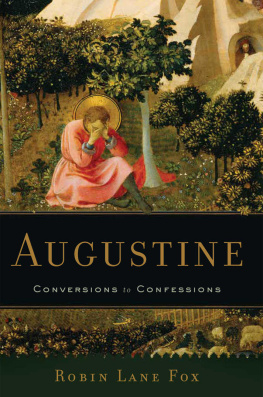OXFORD WORLDS CLASSICS
CONFESSIONS
AUGUSTINE was born in 354, the son of a Christian mother and a pagan father who farmed a few acres at Thagaste (now Souk-Ahras in eastern Algeria). Education at the hands of poor teachers could not hinder his acute mind from acquiring a mastery of classical Latin literature, especially Cicero and Virgil whose writings he knew almost by heart. He became a gifted teacher of literature and public speaking successively at Carthage, Rome, and Milan. At Carthage he met a woman by whom he had a son, and with whom he lived faithfully for fifteen years until at Milan she became a fatal block in the path of his secular career. A personal crisis followed. Already in Africa his religious quest took him to Manichee theosophy, then in Italy to scepticism and thence to the Neoplatonic mysticism of Plotinus. In July 386 in a Milan garden he resolved to abandon a secular career and the respectable marriage that would make this possible. Baptized by St Ambrose (387), he buried his widowed mother at Ostia and returned to North Africa (388). Against his will he was forced into ordination in 391 and five years later became bishop at Hippo (modern Annaba) for the remaining thirty-four years of his life. A fluent and voluminous writer on theology, philosophy, and sex, his writings made him influential and controversial both in his lifetime and in the subsequent history of Christendom. He died during the Vandal siege of his city (28 August 430).
HENRY CHADWICK is former Master of Peterhouse, Cambridge, and General Editor of the Oxford History of the Christian Church, and Oxford Early Christian Texts. His other publications include Augustine in the Past Masters Series (OUP, 1986), Boethius: The Consolations of Music, Logic, Theology, and Philosophy (Clarendon paperbacks, 1981), and Early Christian Thought and the Classical Tradition (OUP, 1984).
OXFORD WORLDS CLASSICS
For almost 100years Oxford Worlds Classics have brought
readers closer to the worlds great literature. Now with over 700
titlesfrom the 4,000-year-old myths of Mesopotamia to the
twentieth centurys greatest novelsthe series makes available
lesser-known as well as celebrated writing.
The pocket-sized hardbacks of the early years contained
introductions by Virginia Woolf T. S. Eliot, Graham Greene,
and other literary figures which enriched the experience of reading.
Today the series is recognized for its fine scholarship and
reliability in texts that span world literature, drama and poetry,
religion, philosophy and politics. Each edition includes perceptive
commentary and essential background information to meet the
changing needs of readers.
OXFORD WORLDS CLASSICS

SAINT AUGUSTINE
Confessions

Translated with an Introduction and Notes by
HENRY CHADWICK


Great Clarendon Street, Oxford 0X2 6DP
Oxford University Press is a department of the University of Oxford.
It furthers the Universitys objective of excellence in research, scholarship,
and education by publishing worldwide in
Oxford New York
Athens Auckland Bangkok Bogot Buenos Aires Calcutta
Cape Town Chennai Dar es Salaam Delhi Florence Hong Kong Istanbul
Karachi Kuala Lumpur Madrid Melbourne Mexico City Mumbai
Nairobi Paris So Paulo Singapore Taipei Tokyo Toronto Warsaw
with associated companies in Berlin Ibadan
Oxford is a registered trade mark of Oxford University Press
in the UK and in certain other countries
Published in the United States
by Oxford University Press Inc., New York
Translation, Introduction, and Notes Henry Chadwick 1991
Database right Oxford University Press (maker)
First published as a Worlds Classics paperback 1992
Reissued as an Oxford Worlds Classics paperback 1998
All rights reserved. No part of this publication may be reproduced,
stored in a retrieval system, or transmitted, in any form or by any means,
without the prior permission in writing of Oxford University Press,
or as expressly permitted by law, or under terms agreed with the appropriate
reprographics rights organizations. Enquiries concerning reproduction
outside the scope of the above should be sent to the Rights Department,
Oxford University Press, at the address above
You must not circulate this book in any other binding or cover
and you must impose this same condition on any acquirer
British Library Cataloguing in Publication Data
Data available
Library of Congress Cataloging in Publication Data
Data available
ISBN 0-19-283372-3
9 10 8
Printed in Great Britain by
Clays Ltd, St Ives plc
Contents
God transcendent, yet withininfancyspeechalmost baptizedlearning GreekLatin literatures corruption.
Sexual adventurestheft of pears: alone I would never have done itthe peer group.
Sex, theatre, and showsthe catharsis of tragedythe WreckersCiceros Hortensius revulsion from scriptureto the Manicheesabsolute and relative ethicsMonicas dreamthe son of many tears.
Selling rhetoricconcubineno animal sacrificeastrologyVindicianusNebridiusdeath of a dear friendfor Hierius on beauty and proportionAristotles Categories.
Restless without Godreconciling science and Genesiseclipsesmeeting Faustus of Mileurhetorical style irrelevant to truthdisillusion with Manimove to RomeAcademic scepticismevildishonest students at RomeI came to Milan to Ambrosea catechumen loosely attached to the Church.
Monica follows to Milanher offerings at martyriaAmbroses sermons and biblical authoritycertaintypanegyric on Valentinian IIa drunken beggardisappointed ambitionsAlypius at Carthage, Rome, and Milanaddiction to gladiatorsa civil servants integrityhis aversion to sexAugustines proposed marriagehis concubine back to Africa.
Materialist notionsfree will and Evilrejection of astrologyFirminusthe books of the PlatonistsSt Johns prologueascent to a momentary vision of the eternalthe incarnate Lord the way.
SimplicianusVictorinus baptismPonticianus on Antony and ascetics at Milan and Triermake me chaste but not yeta garden at Milan.
Renunciation of a secular careerVerecundus and Nebridius die baptizedpsalm 4baptism at Milanpsalms and hymnsGervasius and ProtasiusMonicas life: youthful addiction to wineher fidelityvision at Ostiadeath and burialwhy grief?
Loves silent criescuriosity about my pastloving the incorporealmemorys vast recessesthe stomach of the mindforgetfulnessremembering past happinesslate have I loved yougrant what you commandtemptationsfood and drink; musicthe eyescurious researchespridethe Mediator, priest and victim.
Gods Word, and the successiveness of wordswhat was God doing before creation?foolish questionwhat is time? a measurement? a distension in the soul?
Matter and formformlessness in Genesis 1: 2; knowing the unknowableManichee shapesdistance from God is dissimilaritycreation out of nothingtime and changeheaven of heaven not coctcrnal, yet not changingformless matter outside timeCatholic critics of my exegesisGod wills change, does not change his willGenesis 1: 1many interpretations valid if orthodoxtruth shared, not privateis the biblical authors intention the only true meaning?
Next page
